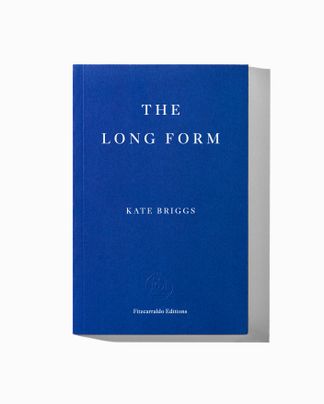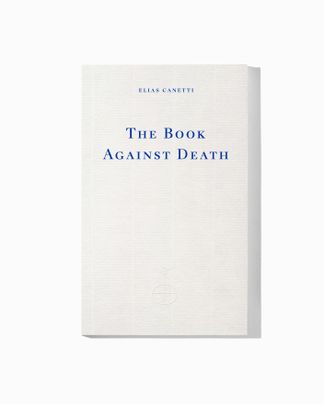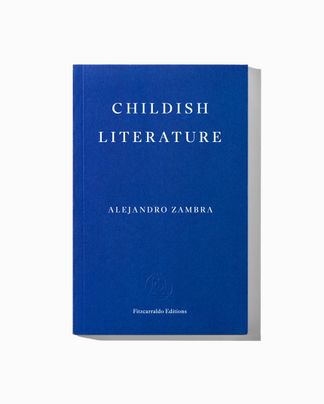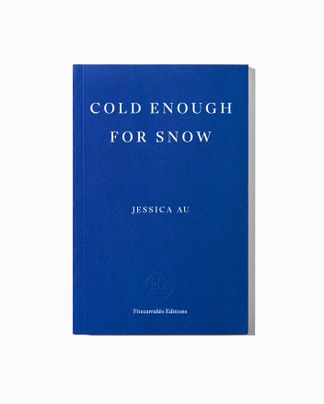Lili is Crying, Hélène Bessette’s debut novel, explores the fraughtness and depth of the troubling relationship between Lili and her mother Charlotte. With a near-mythic quality, Bessette’s stripped-back prose evokes at once the pain of thwarted love – of desire run cold – and the promise of renewal. Lauded by critics on its initial publication in 1953 for its boundary-pushing style, unusual economy of expression, strange humour and sheer vivacity, Lili is Crying announces Bessette’s singular take on the ‘poetic novel’. This edition marks the very first translation of Bessette’s work into English, by Windham-Campbell Prize-winning author and translator Kate Briggs.
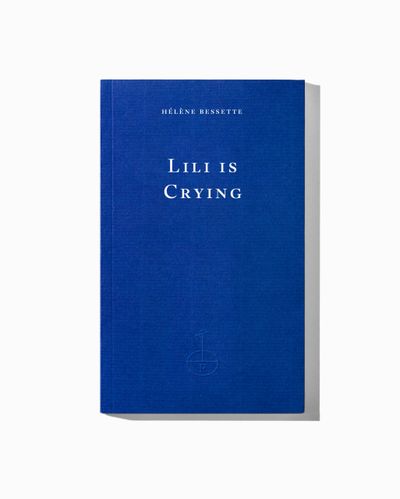
Lili is Crying
Translated by Kate Briggs, with an introduction by Eimear McBride
Fitzcarraldo Classic No.9 | French paperback with flaps, 192 pages
Published 5 June 2025
Lili is Crying
Translated by Kate Briggs, with an introduction by Eimear McBride
PART I.
— Hell damnation, cruelty, lies, deceit, betrayal, tears, severances, assassination, calumny, perfidy, misery and death, says the shepherd.
He is driving his sheep down the stony footpath that edges the garden beneath the ruined tower set high on the parched, barren hillside, bleached white in the Provençale sun.
— Hell damnation, cruelty, lies, deceit, betrayal, tears, severances, assassination, calumny, perfidy, misery and death.
The mistral is up.
Pale blades of wheat sweep the length of the dusty track. The serried sheep press forward and behind them, the shepherd.
Invisible rain, warm and soft, sinks into the dust.
And the mistral to carry it away.
The open tower a silhouette against the low cloud hanging through it.
A wind swirls. A block of wall crumbles.
— Lili, Lili!
calls the mother Charlotte.
She is wearing a straw hat trimmed with a broad black ribbon.
She is coming in from the garden.
The dark outline of the cypress tree, grown as tall as the heavy cloud of the tower, too close; it lords over us.
She has been cutting red roses in the fat and bumping rain.
— Lili, Lili, where are you Lili? My Lili.
From a window embowered with plants, Lili leans out. She tries to catch her mother’s eye.
— Here I am, Maman.
Her ageing face, her forty-year-old face, framed by the floral window.
— My Lili, says the mother Charlotte. I was so afraid.
I thought you were outdoors.
It’s about to storm.
A lightning flash.
Go in, Lili, go in.
Don’t just stand there in the frame of that gussied-up window.
— You were calling for me, Maman?
— That’s enough, girly, go inside. I’m coming in now, too.
Crash of thunder. The low gate slammed back against the frenzied mistral, the flower-trimmed window refastened.
And the rain buffeting against the window-panes, the lowered blinds.
— Lili, fetch me a vase for these red roses.
No, Lili, not that one – the other one, on top of the living room cabinet.
No, Lili, not that one – you’re not there yet.
That’s right. You’ve found it. Do you know how to put flowers in a vase Lili?
My Lili, I’ll leave it to you to arrange these flowers in the vase.
Rumble of thunder.
In the same moment: a lightning flash.
The wind easing.
Rain splashing down
noisily, manically, frantically, ecstatically, qualmed, calmed.
— Don’t switch on the lights, Lili! You’ll draw the lightning.
Don’t switch on the lights.
— Yes Maman.
The bowing head of this forty-year-old Lili, her face dark against the white screen of the windows zebraed with rain, the starched curtains, long and pale.
— Yes Maman.
— Come here, Lili, come closer,
whispers the mother Charlotte. (She is whispering because she is afraid of the storm.)
She is seated in the wicker armchair, its base softened with cushions.
With Lili at her feet.
— My daughter, my Lili.
The two of them huddled together.
Thunder, lightning flashes, rumblings, crashings, clappings, distancings, the mistral let loose, the mistral stunned, choked, thwarted, lurking in the corner of banked clouds. The sky disfigured.
Water tromping.
The fig tree in the garden bent double.
— Thank heavens, my Lili, that you and me, you the daughter and me the mother, we love each other in life and can shelter here together in this good and gentle Provençale house.
The calm hour strikes inside the house as, outside, the storm grumbles on.
Why, Lili, you’re crying! Why are you crying?
Lili is crying.
And outside the storm has moved off,
the wind abated,
the rain sated,
the fig tree righted.
But still, Lili is crying.
— I’m ringing the lunch bell! calls the mother Charlotte.
Come along now, get a move on, come indoors, boarders of my boarding house.
I’m ringing the lunch bell! Now is the hour.
It’s aubergines-and-tomatoes time, figs-and-pomegranates time, capers-and-peppers time.
I’m ringing, I’m ringing.
The black ribbon around my hat is coming loose.
I’m ringing, I’ve put on my white lace-up espadrilles.
My ankles are still shapely.
My ringing hand still noble.
Come along now, do come in. Only, please, mind the flowerbeds.
The gardener handed in his notice – I’m the one tending the carnations.
You’re in my home, boarders of my boarding house, and: if only they’d say hello, greet me as they shuffle past with their pensioner faces, as I stand here ringing the lunch bell.
I know, I know.
I know your stories, my elderly and antiquated boarders, I know all about your spent fortunes, your past glories, your flirtations, and your senior love affairs.
— At your age!
in my beautiful house that I make bloom for you.
Mind! I beg of you, please, have a care.
If you can’t pay then you can’t come in.
Greetings, greetings!
— Why yes, a lovely time of year.
Old age regreened.
Tenacious old age.
Why yes, beautiful weather, still sky, blue wind, clear air, gentle day.
Come in, come in. Come out from under the shade of the great fig tree, come up to the tall door, come in to the cool, darkly panelled dining room, approach the colourful glazed plates, the bowls of fruit, the pewter dishes.
May you each take your share.
No, not two portions all for yourself.
You’re not starving.
No need to behave like greedy pigs.
That’s the way, be polite. Show some manners. Be generous with your smiles, your little attentions.
As for me, says the mother Charlotte, I have now finally finished ringing this lunch bell.
The ribbon on my hat has come undone. I shall have to retie it in my still garden, under its cool bowers, in the shade of its leafy trees.
But here’s Lili.
— There you are, Lili! cries the mother Charlotte. Where were you? I was looking for you everywhere.
I had to prepare the hors d’oeuvres all by myself.
Why, what is it my darling? Whatever’s the matter?
Tell me all about it! Tell me everything. Daughters tell their mothers everything.
— Yes, Maman, says Lili, turning to face the mother
Charlotte, her face the youthful face of a twenty-year-old girl from Arles (the self-same face that a man once killed himself over).
Her face golden, velvety, soft, soft, very soft, so soft, too soft, and her eyes brown (the self-same eyes that once caused a man to take his own life).
She turns her waist towards the mother Charlotte, the waist of a young-girl-from-Arles, and her rounded hips under her pleated skirt.
She turns her dark wavy hair tucked beneath a brightly coloured scarf.
She turns her tears.
The tears of the girl from Arles, who never appears in the story, whom no one can ever remember having seen.
Tears trickle down without spoiling her twenty-year-old face, her round chin, her stung lips, the play of light and shadow on her downy cheeks.
For Lili is crying.
— Bon appétit, says the mother Charlotte.
My fees are high, but they’re well looked after. I call out ‘Bon appétit’ whenever I enter the dining room, as the meek hubbub of their voices thins out, falls silent, picks up again.
Everything has to be paid for; I wouldn’t give out a ‘Bon appétit’ for free.
She pushes Lili into the pantry.
— Lili, my darling, we’ll talk about this at naptime.
I can guess the cause of your tears, my Lili.
Dry your eyes, Lili.
As the mother, I guess, and I console.
— We’ll speak of it the moment lunch is over, at naptime.
Then they both glance up as Lili pushes at the shut shutter of the narrow pantry window with her hand, opening it onto the sun and the tower, rugged and white.
Bellwethers belling, chimes chiming, sheep sheeping all the way down the steep stony path winding its way all the way down the mountain in the summer heat:
— Engagement, marriage, toasts – love, fortune, kindness and luck, forgiveness, joy, rejoicing, a child – smiles, harmony song and dance, says the shepherd, a slow-moving silhouette against the sun in the sky.
And the bells ringing all around the hill, muffled bells, answering bells, bells jangling all the way down the twisting paths of the parched mountain.
— Dance and song harmony smiles, sun and day, marriage, love, birth and joy.
— Greetings, cousins! the shepherd cries out.
He lifts his felt hat and shakes it – a belated gesture, a distanced gesture as the last, late bell rings out, falls silent.
And the dog.
(…)
‘In Hélène Bessette’s novel Lili is Crying, the tears are unavoidable. They’re in the title, and ten pages in, I was emailing everyone I could about the book. It felt electric and urgent, as if Bessette should have long been in my canon, with Ingeborg Bachmann or Elizabeth Hardwick, Lynne Tillman and Annie Ernaux…. Lili shares the cartoon’s casual violence, which is not to say the novel is comic, though at times it is, yes, darkly funny. It is beautiful, brutal.’
— Jennifer Kabat, 4 Columns
‘This scintillating 1953 novel from Bessette (1918–2000) follows the beautiful Lili, who’s 40 and looks 20, through one heartache after another as she contends with her possessive mother’s hold on her…. What keeps this novel running is not the plot but Bessette’s remarkable prose, complete with freewheeling swerves from spoken dialogue to internal monologue, propelling the action without losing sight of the characters’ intense emotions. Briggs’s ear is highly trained to Bessette’s singular register, making this rediscovery all the more noteworthy.’
— Publishers Weekly, starred review
‘A tale of bust-ups, mistakes and life-ruining decisions in a fiery, fickle relationship between a mother and daughter.… Bessette’s prose is prickly and snappy, with short lines and speech introduced by dashes … the effect is one of a verse drama, with a mocking chorus in the wings. People’s ages change and remain the same, defying chronology…. [A] story of unachieved dreams and the pain of continuing to hope.’
— Francesca Peacock, The Spectator
‘Dazzling… Bessette draws out a visceral reaction as pure and immediate as that of crying: something like unease, aversion or even revulsion…. Bessette’s mark – exacting, passionate and complete – lingers long after it is first made.’
— Rachel Dastgir, Review 31
‘Kate Briggs’s deft translation brings Hélène Bessette’s novel into English for the first time. Bessette plays with line breaks and typography, exercising what Eimear McBride refers to in her beautiful introduction as “formal indiscipline”…. Lili is Crying is the loudest book I have ever read. From Lili’s “desperate sobs” to the “trumpeting love” of Lili and the shepherd, the writing rattles like a set of cutlery in a tumble dryer. Miraculously, all the noise coheres into an elegant symphony.’
— Oonagh Devitt-Tremblay, Literary Review
‘Living literature, for me, in France today – it’s Hélène Bessette.’
— Marguerite Duras
‘Lili is Crying is stunning: a choral fever-dream of a book cycling through passion and despair, loyalty and betrayal. Bessette’s cadence and lyrical concision are bewitching and necessarily airless, much like the mother-daughter relationship they chronicle. It’s also a vivid and unforgettable portrait of place – a sun-drenched landscape with world war at its fringes, and the slow fade of one era into another. Kate Briggs’s translation is a powerful channelling of Bessette’s voice: distinct, unapologetic and eerily present.’
— Daisy Lafarge, author of Lovebug
‘I’m grateful to Kate Briggs for her translation of Lili is Crying – a tragic, comic, invigorating book with an eccentric staccato style that blurs speech and thought.’
— Kathryn Scanlan, author of Kick the Latch
‘A manic, brilliant maze of a book. Circular, cinematic, comic.’
— Sinéad Gleeson, author of Hagstone
‘Lili is Crying is not straightforwardly tragic – as the title may initially trick us into believing – but darkly funny, marvellously strange, insistently performative and, somehow, truer than true.’
— Saba Sams, author of Send Nudes
‘This book is brilliant and bizarre, a Grey Gardens-esque tragicomedy, as if written by a sinister cousin of Stevie Smith.’
— Camilla Grudova, author of The Coiled Serpent
‘AT LAST, SOMETHING NEW.’
— Raymond Queneau, author of Zazie in the Metro
Hélène Bessette (1918–2000) published thirteen novels with Gallimard between 1953 and 1973, won the Cazes prize in 1954 and was twice in the running for the Goncourt prize and the Médicis prize.
Kate Briggs grew up in Somerset, UK, and lives and works in Rotterdam, NL, where she founded and co-runs the writing and publishing project ‘Short Pieces That Move’. She is the translator of two volumes of Roland Barthes’s lecture and seminar notes at the Collège de France: The Preparation of the Novel and How to Live Together, both published by Columbia University Press. This Little Art, her genre-bending essay on the art of translation, was published by Fitzcarraldo Editions in 2017. In 2021, she was awarded a Windham-Campbell Prize. Her debut novel, The Long Form, was published by Fitzcarraldo Editions in 2023 and shortlisted for the Goldsmiths Prize the same year.
Eimear McBride is the author of four novels: A Girl is a Half-formed Thing, The Lesser Bohemians, Strange Hotel and The City Changes Its Face. She held the inaugural Creative Fellowship at the Beckett Research Centre, University of Reading and is the recipient of the Women’s Prize for Fiction, the Goldsmiths Prize, Kerry Group Irish Novel of the Year, and the James Tait Black Memorial Prize.

